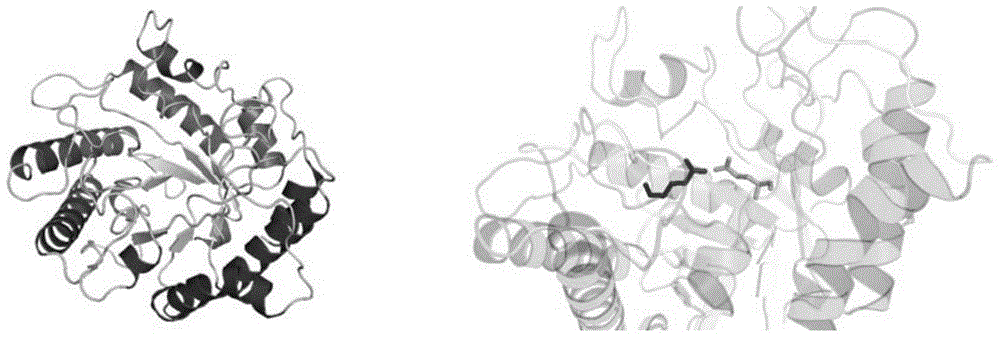f175-3 protein and its coding gene and application of hydrolyzed cellulose
A technology of cellulase and protein, applied in the fields of application, hydrolase, genetic engineering, etc., can solve the problems that limit the efficient development of the biofuel industry
- Summary
- Abstract
- Description
- Claims
- Application Information
AI Technical Summary
Problems solved by technology
Method used
Image
Examples
Embodiment 1
[0041] Cloning of embodiment 1, F175-3 gene
[0042] In the previous study, the metagenomic library of the dry fermented sludge system was constructed using the Fosmid vector. Using the Congo red-cellulose plate, an E. coli host clone containing cellulase activity was screened. The insert fragment contained in Fosmid is 37655bp, the ORF is predicted by softberry, and annotated by NCBI and Pfam database. Obtain the F175-3 gene, the nucleotide sequence of this gene is the 7-1293 nucleotides from the 5' end of sequence 1 in the sequence listing, the protein encoded by it is named F175-3, and its amino acid sequence is the sequence in the sequence listing 2 Amino acids 1-429 from the N' terminal. After comparison, the F175-3 protein had the highest similarity of 59% with the cellulase from uncultured bacteria, and it was predicted to be a cellulase.
Embodiment 2
[0043] Embodiment 2, the application of F175-3 as cellulase
[0044] 1. Construction of recombinant vector
[0045] Using the artificially synthesized sequence 1 as a template, using F175-3F and F175-3R as primers, and using TAKARA's PrimeStar high-fidelity enzyme to perform PCR amplification, a 1302bp PCR product was obtained, and its nucleotide sequence was sequence 1.
[0046] F175-3F:5'-CATG CCATGG CGAAAACCGGCGATCAG-3' contains Nco I restriction site
[0047] F175-3R:5'-CCC AAGCTT CTGGGCATATCTGATCATCG-3' contains Hind III restriction site
[0048] The above PCR amplification system is as follows:
[0049]
[0050] The PCR program is as follows:
[0051] Pre-denaturation at 94°C for 1 min
[0052] 98°C 10s
[0053] 68℃ 80s
[0054] Back to 2, 24 cycles
[0055] 72℃ 5min
[0056] end
[0057] The above PCR product was double digested with Nco I and Hind III, and the resulting digested product was ligated with the pET-28a vector (Novagen pET-28a DNA Cat. No. 6...
PUM
 Login to View More
Login to View More Abstract
Description
Claims
Application Information
 Login to View More
Login to View More - Generate Ideas
- Intellectual Property
- Life Sciences
- Materials
- Tech Scout
- Unparalleled Data Quality
- Higher Quality Content
- 60% Fewer Hallucinations
Browse by: Latest US Patents, China's latest patents, Technical Efficacy Thesaurus, Application Domain, Technology Topic, Popular Technical Reports.
© 2025 PatSnap. All rights reserved.Legal|Privacy policy|Modern Slavery Act Transparency Statement|Sitemap|About US| Contact US: help@patsnap.com



